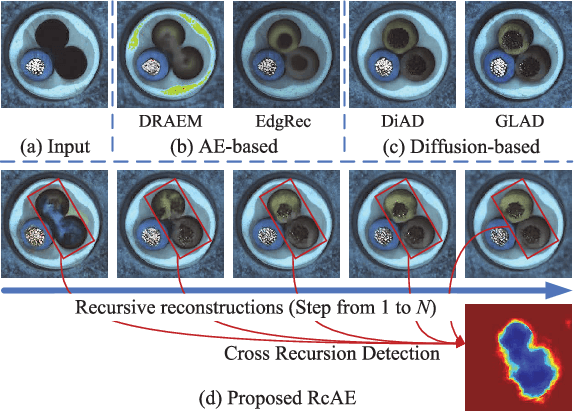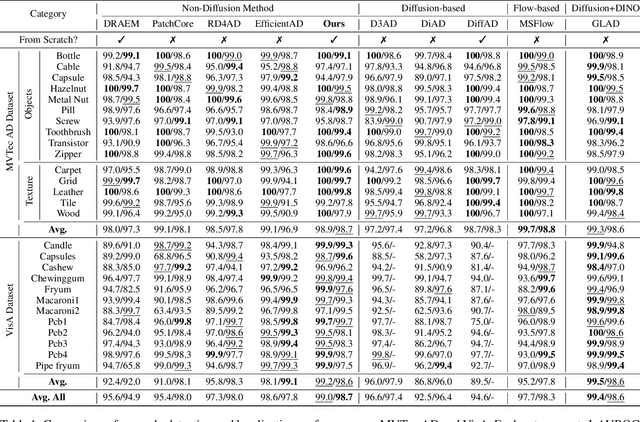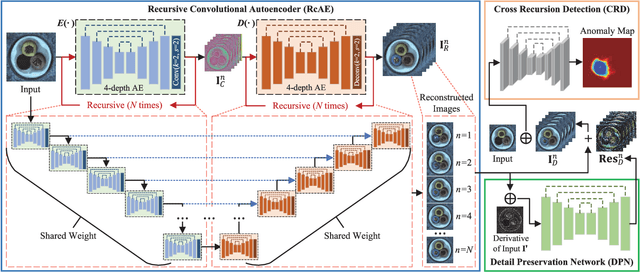Qiyu Liao
RcAE: Recursive Reconstruction Framework for Unsupervised Industrial Anomaly Detection
Dec 12, 2025



Abstract:Unsupervised industrial anomaly detection requires accurately identifying defects without labeled data. Traditional autoencoder-based methods often struggle with incomplete anomaly suppression and loss of fine details, as their single-pass decoding fails to effectively handle anomalies with varying severity and scale. We propose a recursive architecture for autoencoder (RcAE), which performs reconstruction iteratively to progressively suppress anomalies while refining normal structures. Unlike traditional single-pass models, this recursive design naturally produces a sequence of reconstructions, progressively exposing suppressed abnormal patterns. To leverage this reconstruction dynamics, we introduce a Cross Recursion Detection (CRD) module that tracks inconsistencies across recursion steps, enhancing detection of both subtle and large-scale anomalies. Additionally, we incorporate a Detail Preservation Network (DPN) to recover high-frequency textures typically lost during reconstruction. Extensive experiments demonstrate that our method significantly outperforms existing non-diffusion methods, and achieves performance on par with recent diffusion models with only 10% of their parameters and offering substantially faster inference. These results highlight the practicality and efficiency of our approach for real-world applications.
Estimating Pasture Biomass from Top-View Images: A Dataset for Precision Agriculture
Oct 27, 2025Abstract:Accurate estimation of pasture biomass is important for decision-making in livestock production systems. Estimates of pasture biomass can be used to manage stocking rates to maximise pasture utilisation, while minimising the risk of overgrazing and promoting overall system health. We present a comprehensive dataset of 1,162 annotated top-view images of pastures collected across 19 locations in Australia. The images were taken across multiple seasons and include a range of temperate pasture species. Each image captures a 70cm * 30cm quadrat and is paired with on-ground measurements including biomass sorted by component (green, dead, and legume fraction), vegetation height, and Normalized Difference Vegetation Index (NDVI) from Active Optical Sensors (AOS). The multidimensional nature of the data, which combines visual, spectral, and structural information, opens up new possibilities for advancing the use of precision grazing management. The dataset is released and hosted in a Kaggle competition that challenges the international Machine Learning community with the task of pasture biomass estimation. The dataset is available on the official Kaggle webpage: https://www.kaggle.com/competitions/csiro-biomass
SGIA: Enhancing Fine-Grained Visual Classification with Sequence Generative Image Augmentation
Dec 09, 2024



Abstract:In Fine-Grained Visual Classification (FGVC), distinguishing highly similar subcategories remains a formidable challenge, often necessitating datasets with extensive variability. The acquisition and annotation of such FGVC datasets are notably difficult and costly, demanding specialized knowledge to identify subtle distinctions among closely related categories. Our study introduces a novel approach employing the Sequence Latent Diffusion Model (SLDM) for augmenting FGVC datasets, called Sequence Generative Image Augmentation (SGIA). Our method features a unique Bridging Transfer Learning (BTL) process, designed to minimize the domain gap between real and synthetically augmented data. This approach notably surpasses existing methods in generating more realistic image samples, providing a diverse range of pose transformations that extend beyond the traditional rigid transformations and style changes in generative augmentation. We demonstrate the effectiveness of our augmented dataset with substantial improvements in FGVC tasks on various datasets, models, and training strategies, especially in few-shot learning scenarios. Our method outperforms conventional image augmentation techniques in benchmark tests on three FGVC datasets, showcasing superior realism, variability, and representational quality. Our work sets a new benchmark and outperforms the previous state-of-the-art models in classification accuracy by 0.5% for the CUB-200-2011 dataset and advances the application of generative models in FGVC data augmentation.
Enhancing User-Centric Privacy Protection: An Interactive Framework through Diffusion Models and Machine Unlearning
Sep 05, 2024



Abstract:In the realm of multimedia data analysis, the extensive use of image datasets has escalated concerns over privacy protection within such data. Current research predominantly focuses on privacy protection either in data sharing or upon the release of trained machine learning models. Our study pioneers a comprehensive privacy protection framework that safeguards image data privacy concurrently during data sharing and model publication. We propose an interactive image privacy protection framework that utilizes generative machine learning models to modify image information at the attribute level and employs machine unlearning algorithms for the privacy preservation of model parameters. This user-interactive framework allows for adjustments in privacy protection intensity based on user feedback on generated images, striking a balance between maximal privacy safeguarding and maintaining model performance. Within this framework, we instantiate two modules: a differential privacy diffusion model for protecting attribute information in images and a feature unlearning algorithm for efficient updates of the trained model on the revised image dataset. Our approach demonstrated superiority over existing methods on facial datasets across various attribute classifications.
 Add to Chrome
Add to Chrome Add to Firefox
Add to Firefox Add to Edge
Add to Edge